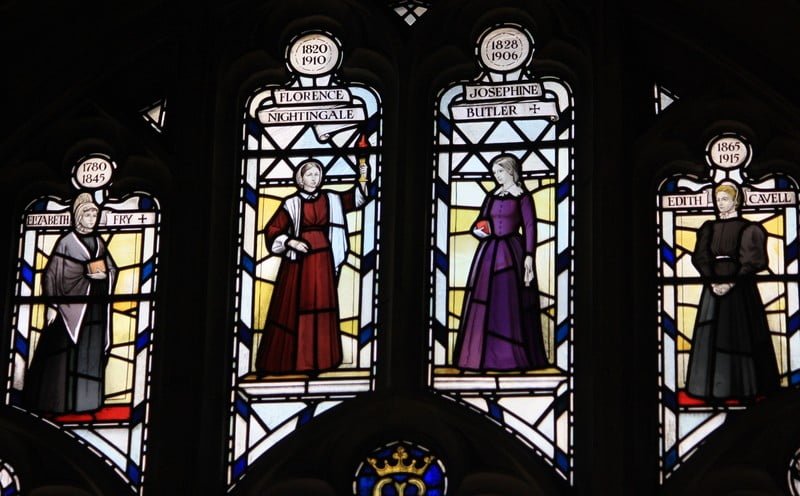St Olave Hart Street, Ladies’ Light
Talk given by Bishop of London Rt Revd Sarah Mullally
13th June 2023
On the 12th of May 2018 (Florence Nightingale’s birthday) I was installed as the 133rd Bishop of London – the first woman in this role. I could not do what I do today if it was not for my Christian faith and if I had not undertaken to train as a nurse at the Nightingale School of Nursing. That training enlarged my capacity to be with people and to stay with them when it would be easier to walk away. It developed within me the skills of a reflective practitioner and the ability to apply a theoretical framework, for which I am grateful.
It has not passed me by that I was installed as the first female Bishop of London in the year when we marked 100 years after some women were given the vote, and in the week when, one hundred and five years earlier, suffragettes placed a bomb under the seat on which I was now being enthroned. Vergers were just as eagle-eyed then as they are now, and the bomb didn’t go off.
At my consecration as a bishop on the feast of Mary Magdalene, the former Bishop of Stepney reminded us that Jesus chooses outsiders not so much to disturb the comfortable, but to disturb the conventional, and that it is through the disturbance caused by people like Mary Magdalene that we learn to see the world and God afresh.
I would suggest that Elizabeth Fry, Florence Nightingale, Josephine Butler and Edith Cavell, pictured in this stain glass window, are four such women: women who disturbed convention in order to bring about change.
St Olave’s Hart Street is shaped by plague, war, slavery and Christian faith therefore it is appropriate that there is a window to these four women all of whose stories are shaped by the same. All four women worked out their Christian faith in a culture where women faced challenges in both the church and the wider world: and yet their lives and actions were transformative.
Their lives were all rooted in a Christian faith. Edith Cavell, the daughter of a priest, said it was her faith and her understanding of God’s love which motivated her vocation as a nurse, aspiring to demonstrate genuine love for all – a love which was generous, seeking the best for others.
Josephine Butler was a passionate Christian, who once said, ‘God and one woman make a majority’. She understood what it meant to love, not with words or tongue, but with action and in truth. Like Jesus, she was happy to be counted amongst those society saw as second class citizens and to fight for them.
Elizabeth Fry was from a Christian family who followed the Quaker tradition, believing that all people are equal in God’s eyes and worthy of equal treatment.
Florence Nightingale made no secret of the experience of a literal calling from God. In 1873, in an address given to nurses, she said of a nurse’s call to service: ‘Feeling God has made her what she is, she may seek to carry on her work in the hospital as a fellow worker with God. Remembering that Christ died for her, she may be ready to lay down her life for her patients.’ (p10 Florence Nightingale by Lyn McDonald)
In talking about prayer, Florence wrote:
‘It did strike me as odd, sometimes, that we should pray to be delivered from ‘plague, pestilence and famine’ when all the common sewers ran into the Thames, and fevers haunted undrained land and the districts which cholera would visit could be pointed out. I thought that Cholera came that we might remove the causes, not pray that God would remove the Cholera’. (Suggestions for Thought, 1860)
Each year at the service of ordination of deacons I say that deacons ‘are to work with their fellow members in searching out the poor and weak, the sick and lonely and those who are oppressed and powerless, reaching into the forgotten corners of the world, that the love of God may be made visible’ (Ordination of Deacons, Common Worship, Church of England).
It seems to me that all four women did this. With prostitutes, prisoners, those sick and suffering from poor housing and sewage systems, and even the enemy.
Josephine Butler threw herself into charity work, particularly related to the rights of women. Amongst the issues on which she campaigned was child prostitution and she was part of a group which forced Parliament to raise the age of consent from 13 to 16.
In 1869, Josephine began her campaign against the Contagious Diseases Acts. These had been introduced in the 1860s in an attempt to reduce venereal disease in the armed forces. Police were permitted to arrest women living in seaports and military towns who they believed were prostitutes and force them to be examined for venereal disease. Josephine Butler toured the country making speeches condemning the Acts. Many people were shocked that a woman would speak in public about sexual matters. The Acts were suspended in 1883 and repealed three years later.
Edith Cavell had been director of a nursing school in Belgium. When Germany was poised to invade Belgium, she returned to be with the nurses she had trained. She insisted that their calling was to care for all, friend and foe alike, and provided nursing care for Allied and enemy troops. On the 15th October 1915, she was shot and killed by a German firing squad, for assisting Allied soldiers to escape.
Elizabeth Fry was so moved by the conditions in Newgate prison and on the ships transporting convicts that she campaigned for improvements in the prison system and promoted the idea of rehabilitation instead of harsh punishment. This was taken on by the city authorities in London. Elizabeth visited convict ships to provide occupations for the women and education for their children. She helped the homeless by establishing a “nightly shelter” in London, after seeing the body of a young boy in the winter of 1819–1820.
After the abolition of the slave trade in the British Empire, slavery remained in European colonies. Elizabeth Fry in particular campaigned for abolition in Danish and Dutch colonies.
Florence Nightingale, Elizabeth Fry, Josephine Butler and Edith Cavell remind us that to have compassion is not just about words, but it demands the best of us – the best standards of care and training. If we are to expect healthcare professionals to care for all without discrimination and with care which is of the highest standard, we need to resource them – with time, skills and resilience.
They all, I believe, at times have been misremembered because they were women. It is likely that when we remember Florence we do so as the lady with the lamp. She gained the nickname during the Crimean campaign, from a phrase in a report in The Times (8th February 1855):
‘She is a ‘ministering angel’ without any exaggeration in these hospitals, and as her slender form glides quietly along each corridor, every poor fellow’s face softens with gratitude at the sight of her. When all the medical officers have retired for the night and silence and darkness have settled down upon those miles of prostrate sick, she may be observed alone, with a little lamp in her hand, making her solitary rounds.’
The phrase was further popularised by Henry Wadsworth Longfellow’s 1857 poem ‘Santa Filomena’:
Lo! in that hour of misery
A lady with a lamp I see
Pass through the glimmering gloom,
And flit from room to room.
Florence is mostly, therefore, remembered, as the Lady with the Lamp: rather than for her skill as an epidemiologist and the impact of her work on our sewage system and hospital design.
Florence arrived in Scutari in Crimea in November 1854. She and her nurses found wounded soldiers being badly cared for by overworked medical staff in the face of official indifference. Medicines were in short supply, hygiene was being neglected, and mass infections were common, many of them fatal. There was no equipment to process food for the patients.
Death rates did not drop; on the contrary, they began to rise. The death count was the highest of all hospitals in the region. During her first winter at Scutari, ten times more soldiers died from illnesses such as typhus, typhoid, cholera and dysentery than from battle wounds. Conditions at the temporary barracks hospital were fatal to the patients because of overcrowding and the hospital’s defective sewers and lack of ventilation.
Here, where more died of infection than their wounds, Florence learnt that handwashing, social distancing and good ventilation saved lives: all familiar from our own plague.
‘Within 6 months of her arrival in Scutari, the mortality rate dropped from 42 percent to 2.2 percent. Florence insisted on adequate lighting, ventilation, diet, hygiene, and activity. She understood even then that the mind and body worked together, that cleanliness, the predecessor to our clean and sterile techniques of today, was a major barrier to infection, and that it promoted healing’ (Kathy Neeb, Fundamentals of Mental Health Nursing).
On her return to Britain, Florence began to collect evidence for the Royal Commission on the Health of the Army, to demonstrate that most of the soldiers at the hospital were killed by poor living conditions. This experience influenced her later career, when she advocated sanitary living conditions as of great importance, and in peacetime when she turned her attention to the sanitary design of hospitals.
All of these women faced the challenge of their cultures. Florence said that, ‘I would have given her [the Church] my head, my hand, my heart. She would not have them. She did not know what to do with them. She told me to go back and do crochet in my mother’s drawing-room; or if I were tired of that, to marry and look well at the head of my husband’s table. ‘You may go to the Sunday School if you like it,’ she said. But she gave me no training even for that. She gave me neither work to do for her, nor education for it.’ (Florence Nightingale in a letter to Dean Stanley, 1852.)
Florence was often only able to bring about change because of men. William Rathbone, a Liverpool businessman and philanthropist, provided the opportunity for her to act when he contacted her in 1864 with an offer to provide funding for a lady visitor to go into the Liverpool Workhouse Infirmary.
There is, however, another truth which is reflected in this window and in the lives of three of these women: each of their lives encouraged the work of the others. It was Fry’s training school for nurses which inspired Florence Nightingale to develop the Nightingale School of Nursing. In turn, Edith Cavell’s work as the director of a nursing school in Belgium was influenced by Florence.
To live in the service of others is not a popular thought in our society today. However, to serve others is one of the greatest things in life. It is precious and almost as rare, and like all precious things it is costly. For most of us, service requires not so much physical strength as strength of character, imagination and deep reflection. It requires courage. These four women saw both the individual and the need to change the systems and structures to enable more kindness and compassion. They did this with courage.
In a time when the NHS is under pressure and nurses are undervalued, where prisons are overcrowded, where we have hostile immigration legislation, where modern day slavery exists and racial in justice continues we continue to fail the most vulnerable in our society.
Anne–Marie Rafferty writes of Florence Nightingale – but it could be read for all of these women:
‘We can read Nightingale as a credo for compassion today. She recognised that systems needed to foster and institutionalise compassion, and that small touches and details mattered. Leading by example and embedding a code of behaviour that could be sustained even in your absence was and should remain our goal today.
The challenges we see in care are not new. We continue to fail the most vulnerable members of our society. We need to acknowledge there is a problem, accept responsibility and understand the dynamics of why some organisations succeed and others fail.
Clarity of purpose, moral courage and a coalition for action was Nightingale’s response to the call. We need to do likewise – to light and lead the way.’ (‘Nursing Times’, 24th June 2011)
The window in this church which depicts these four women is often overlooked. The same might be said of their contribution to shaping a more compassionate community for those on the margins. And if I were to add a fifth window, I would add Mary Seacole. Their remarkable courage, determination and resilience leads me to end with the words of Amelia Earhart: “The most difficult thing is the decision to act, the rest is merely tenacity”.




